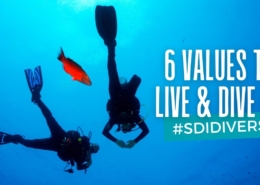That’s Wrong: Misconceptions on Teaching Scuba Diving
By: John Bentley and Brian Shreve
The interwebs are a great place to pick up some great, and some not so great, information. Spend a little time on the various scuba related websites, and it’s amazing some of the just plain wrong things you can read! Here are just a few of them we’ve recently found:
You can’t really teach buoyancy control in the Open Water course
Entry level students can learn buoyancy control from the start. It’s actually super easy. Instructors that have their students kneel to learn skills are doing a disservice to the customer, industry and themselves! Take a step back and think about breathing, equipment balance, and positioning. With that in mind, as an educator, you should be able to convey a buoyancy skill set to a student in the shallow end of the pool, maybe even before they learn any other skill. Take the 5 minutes to teach buoyancy, from the start, and you’ll notice that it makes the rest of the course easier. If you think that buoyancy control is “too much” for the entry level diver you are wrong. If you think it’s impossible to teach buoyancy control to large classes, you are wrong.
OW isn’t a full certification, you need an advanced card to really dive
Unfortunately, this one is all too common and very sad. Divers will get certified, express the fact that they’re uncomfortable, and are told they need an advanced class to “dial things in.”Advanced classes are to advance the skill set of an open water diver to a new level, not to correct deficiencies of subpar training. An open water diver is certified to go diving. If they aren’t comfortable in the water, then they should not be certified. There isn’t anything wrong with remedial work; everyone learns at a different pace, and there isn’t anything wrong with continuing educations. There is something wrong with con-ed being sold as remediation.
Continuing Education is for card collectors
As a self regulated industry, it’s up to our instructors to conduct courses, issue credentials, and the operators and fill stations to evaluate those credentials. “Boat Diver” and “Master Scuba Diver” are often thrown under the bus as useless courses created just to collect money. Maybe that’s true sometimes, but the intention of those programs, and the way many instructors conduct them, add value and skill to divers. It boosts confidence while expanding knowledge. Our industry desperately needs better informed divers for conservation, safety, and industry longevity. The internet divers like to tout about their extreme Google knowledge but it won’t match up to real training conducted by a professional. Not happy with the name of a program? Sign up for it and see what an experienced professional can offer. If they are protecting their passion the program’s depth and breadth may inspire you and surprise you.
Elearning replaces the classroom
This one is all too common, and instructors that think this are wrong. elearning can and should be used in a blended learning environment, but it shouldn’t be used as a stand-alone. You can read more about this here
Mask skills are hard

Take home message for divers and industry professionals alike – trust little of what you read online and believe even less. If you’re an instructor upset with the quality of divers then start teaching more! You have that unique ability to influence your industry. Challenge yourself to master and improve your skill set, regardless of the level of your diving, and leave the internet diving to the posers.









Deixe uma resposta
Want to join the discussion?Feel free to contribute!